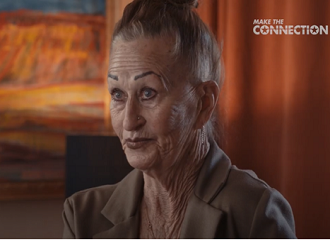After Sexual Assault, Army Veteran Finds Her Path to Healing
3-minute read
After Sexual Assault, Army Veteran Finds Her Path to Healing
3-minute read
It should have been just another evening run on the beach, not the beginning of the end of Bennie’s aspirations for a military career.
Bennie had volunteered to join the U.S. Army in 1968 and quickly discovered how well it suited her. “I loved all the physical activity. I just loved being able to do something. I thought I was really going to be able to benefit my country,” she says. “I was going to see if I could get fast-tracked to OCS [officer candidate school] because I just felt like that was a calling for me.”
That all changed when Bennie was sexually assaulted during that run near her base in California. The assault caused severe injuries and resulted in a pregnancy that ended her military service just about a year after it started. “At that time, you could not be pregnant or have been pregnant,” Bennie says. “Even though it was no fault of my own. I was devastated.”

A Strong Routine
Bennie’s path to healing
As with all survivors of military sexual trauma (MST), Bennie’s path to healing needed to happen on her timetable and with the flexibility to find the solutions that worked best for her. That’s why VA offers Veterans free MST-related services that are tailored for each individual and are available whenever the person is ready.
In Bennie’s case, one of the assailants told her they would kill her if she ever said anything about the attack. It would be many years until she felt comfortable talking about the assault with anyone. “I just never told anybody, ever,” she says.
Bennie began raising her daughter as a single mom, traveled and moved often, and eventually found work she loved involving the outdoors and animals. She pursued medical care and holistic health remedies to manage her severe migraines, panic attacks, nightmares, anorexia, and other challenges.
Bennie first discussed the attack when seeking care for migraines at a VA clinic in Sherman, Texas. “There was a therapist there, and she wanted to talk to me about dealing with the headaches because, I’m serious, I almost died from migraines for years,” Bennie says. The therapist asked Bennie if she was ever bullied in the military. Bennie told her she was.
“She said, ‘Would you like to tell me about it?’” Bennie recalls. “And I told her, and she said, ‘I’m a little scared because you’re telling it as if it didn’t happen to you. I feel like I’m reading a book. … That’s so traumatic. And you’re just sitting there going, “Yeah, and this happened. I went to the store, and I bought some half-and-half.”’ It was like that.”
Bennie wasn’t emotionally ready to dig deeper. She didn’t want to feel afraid. She didn’t want to cry. “I couldn’t get past that,” she says. “I couldn’t get in touch with that, at that time.”
Bennie hit the road again and went to Montana, where she lived for about 6 months in the mountains with her 2 dogs and a horse, rarely seeing anyone. “I was so content,” Bennie says, “but I realized I was also running away.”
Moving again to New Mexico, where she established a nonprofit to train service dogs for Veterans, Bennie found the right match for her mental health needs at the VA medical center in Albuquerque. She praises her doctor there for “always trying to figure out new ways to work with me.”
VA offerings like a mindfulness course, yoga, and tai chi supported the type of techniques Bennie already was practicing. Veterans she met through a VA women’s clinic became important sources of support, and eye movement desensitization and reprocessing therapy helped her manage her panic attacks.
“All those things, they’re like building blocks,” she says. “It gives you something to stand on.”
At the time of her Make the Connection interview, Bennie hadn’t experienced a migraine for 2 years.
“My life has been kind of tough, and I’m so grateful that I’ve been given tools to make it less tough,” she says. About VA, she adds: “They’ve been so good to me here.”
